COMPARISONS of LANGUAGES INVOLVED
in the translation of the MAALAN AARUM |
| INTRODUCTION |
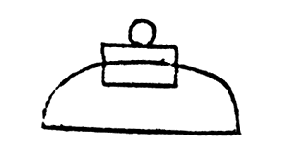
3.1 |
|

3:2 |
They lived where it snowed.
They lived where it stormed.
They lived where it was always winter. |
| Maalan Aarum |
Algonquin |
Old Norse |
Topan
akpinep
winew
akpinep
kshakan
akpinep
thupin
akpinep |
akooppoon
atapin etu
wi'new
atapin etu
kscha chan
atapin etu
akooppoon
atapin etu |
yggr buuendhr
endr aa bua tjaa
fenna
endr aa bua tjaa
geysa gangr
endr aa bua tjaa
yggr buuendhr
endr aa bua tjaa |
 |
|
 |
it freezes
where they abode
It snows
where they abode
it storms
where they abode
it is cold
where they abode |

original English
translation

translation
of Old Norse |
dreadful encamping
remain in a (different) place did
cover with snow
remain in a (different) place did)
big wind
remain in a (different) place did
dreadful encamping
remain in a (different) place did |
WORD (PHRASE) BY WORD (PHRASE) DECIPHERMENT
(All references are to Sherwin’s eight volumes of the Viking and the Red Man) |
| Original English |
it freezes |
|
| Recorded sounds |
to pan |
|
| Algonquin words |
akoo ppoon |
v.6 p.5 meaning, "winter"1* |
| Old Norse |
yggr buuendhr |
|
| Norse/English |
dreadful encamping |
2* |
| |
|
|
| Original English |
where they abode |
|
| Recorded sounds |
ak pinep |
|
| Algonquin words |
at a pinetu |
v. 4 p 17 & 147 5* |
| Old Norse |
endr aa bua tjaa |
Morphed sounds 3* |
| Norse/English |
remain in a (different) place did |
Homeland 4* |
| |
|
|
| Original English |
It snows |
|
| Recorded sounds |
wi new |
|
| Algonquin words |
wi'new |
v. 6 p. 152 |
| Old Norse |
fenna |
|
| Norse/English |
cover with snow |
|
| |
|
|
| Original English |
where they abode |
|
| Recorded sounds |
ak pinep |
|
| Algonquin words |
at a pinetu |
v. 4 p 17 & 147 5* |
| Old Norse |
endr aa bua tjaa |
Morphed sounds 3* |
| Norse/English |
remain in a (different) place did |
Homeland 4* |
| |
|
|
| Original English |
it storms |
|
| Recorded sounds |
ksha kan |
|
| Algonquin words |
kscha chan |
v. 4 p. 63 |
| Old Norse |
geysa gangr |
|
| Norse/English |
big wind |
|
| |
|
|
| Original English |
where they abode |
|
| Recorded sounds |
ak pinep |
|
| Algonquin words |
at a pinetu |
v. 4 p 17 & 147 5* |
| Old Norse |
endr aa bua tjaa |
Morphed sounds 3* |
| Norse/English |
remain in a (different) place did |
Homeland 4* |
| |
|
|
| Original English |
it is cold |
|
| Recorded sounds |
thu pin |
Same as topan 6* |
| Algonquin words |
akoo ppoon |
v.6 p.5 meaning, "winter"1* |
| Old Norse |
yggr buuendhr |
|
| Norse/English |
dreadful encamping |
2* |
| |
|
|
| Original English |
where they abode |
|
| Recorded sounds |
ak pinep |
|
| Algonquin words |
at a pinetu |
v. 4 p 17 & 147 5* |
| Old Norse |
endr aa bua tjaa |
Morphed sounds 3* |
| Norse/English |
remain in a (different) place did |
Homeland 4* |
| back to top |
Notes |
1* The double "oo"s indicate a long "o." The "r" may have morphed into "oo." |
2* Dreadful encampment was an idiom to describe winter. Freezing may have been one word the Recorder understood, when the Historian was trying to communicate “winter.” |
3* This phrase illustrates the changes of sounds through time, distance and speakers. An original “d” became a “t” which became a “k” when recorded in another language. The “b” became a “P” through time.
The original “t” survived through time and became a “p” when recorded.
The “a” and “n” sounds are created in a similar way in a similar location in the mouth. The “a” and “n” sounds appear to have interchanged through time and distance, but the Historian and the Recorder were able to communicate them correctly. |
4* Those who “remain in a (different) place” is a phrase meaning the homeland. |
5* The "ep" syllable is not definite, but "etu" comes closest. |
6* The repeat of the Algonquin word for two different meanings indicates that the recorder may not have been familiar with the Algonquin word for winter. The recorder may have recorded the same sounds differently as the Historian tried to describe winter again, again, and again. |
| back to top |
|

3:3 |
While still in their cold land
They remembered longingly
the mild weather,
the many deer,
and also foxes |
| HUNTERS GO EVERYWHERE |
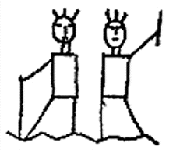
3:4 |
The poor, lonely, but tough men
became hunters and
left those living
in strong houses.
|

3:5 |
Separated from home
like breasts on the same body
the hunters became tougher
extremely good and
they reached for the sky. |

3:6 |
The hunters camped
in the north, east,
south and west. |
| CHRIST TRUMPS ODIN |
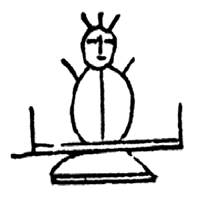
3.7 |
The man, who ruled
in that old, northern land
that they all left,
was baptized to be pure. |
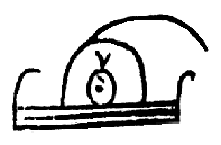
3.8 |
The discouraged people
were worried about
worn out land
they had to abandon.
The priest said,
"We decent people
should go somewhere else."
|
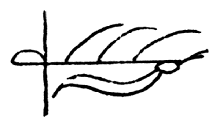
3.9 |
The common people
in the east stole away
the brothers
abandoned all
with great discouragement
and again discouragement |

3.10 |
In a short while
the weeping, weak, dirty.
needy (people from)
the burnt land
saved themselves and
rested on the other side |

3.11 |
After moving down
from the snowy land
and discreetly leaving
the cousins separated
through out all the land |
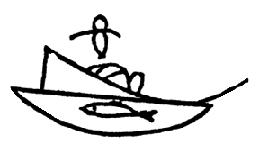
3.12 |
Where there was little
pack ice in heaped ice
with a lot of snow drifts,
the white geese ruled
and the white bear ruled |
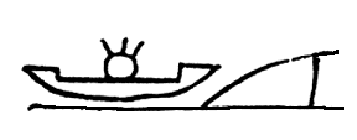
3.13 |
Floating up the streams
in their canoes,
our fathers were rich.
They were in the light
when they were at these Islands. |
| THE DECISION |

3.14 |
"Head Beaver and Big Bird
said 'Let us go to Akomen'" |
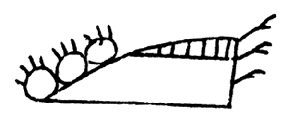
3.15 |
All say they will go along,
All who are free to go. |
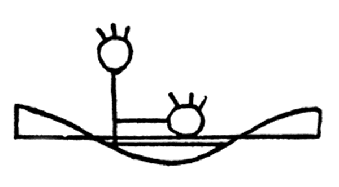
3.16
|
Those of the north agreed.
Those of the east agreed.
Over the waters
Over the frozen sea
They went to enjoy it |
| THE MIGRATION |

3.17 |
On the wonderful slippery water,
On the stone hard water, all went
On the great tidal sea,
Over the [puckered pack ice] |
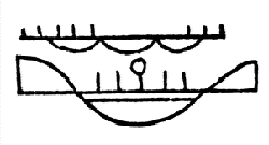
3.18
|
[I tell you it was a big mob]
In the darkness,
all in one darkness
To Akomen, to the [west],
In the darkness
They walk and walk,
all of them |
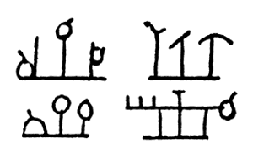
3.19 |
The men from the north,
the east, the south,
The eagle clan, the beaver clan
the wolf clan,
The best men, the rich men,
the head men
Those with wives,
Those with daughters,
Those with dogs |

3.20 |
They all come.
They tarry at the land
Of the spruce pines,
Those from the east
Some with hesitation.
Esteeming highly their
Old home at the mound land |



















